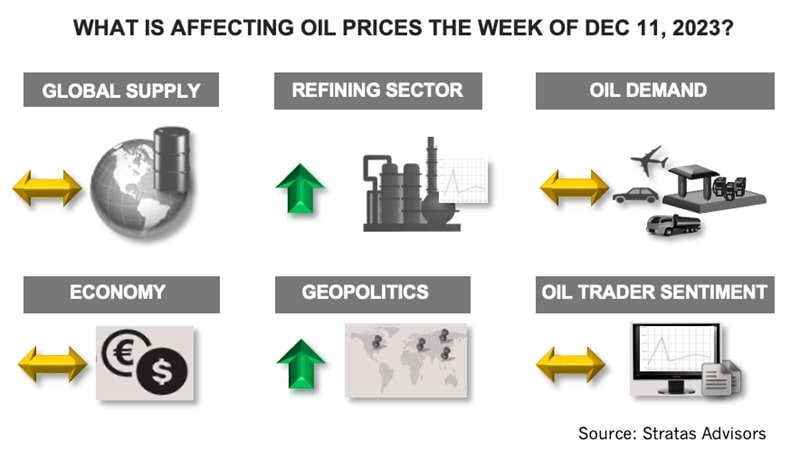The price of Brent crude ended the week at $75.84 after closing the previous week at $79.56. The price of WTI ended the week at $71.23 after closing the previous week at $74.38.

Price fell through the week before rebounding some on Dec. 8, in part, because the latest EIA report indicated that U.S. crude inventories increased by 4.66 MMbbl (dropping slightly below the level of 2019) and U.S. oil production decreased to 13.1 MMbbl/d after being at 13.2 MMbbl/d for eight consecutive weeks. The U.S. jobs report for November was also seen as positive with the U.S. economy adding 199,000 jobs in November.
For the most part, the oil market has remained unimpressed with the announcements coming from the OPEC+ meeting held on Nov. 30.
- OPEC+ agreed to reduce its oil production by an additional 700,000 bbl/d – which will come from Iraq, UAE, Kuwait, Kazakhstan, Algeria and Oman. The additional production cuts will start at the beginning of 2024;
- Additionally, Saudi Arabia agreed to extend its voluntary cut of 1.0 MMbbl/d and Russia agreed to reduce its exports of refined products by 200,000 b/d in addition to its current reduction of 300,000 bbl/d; and
- Also announced at the meeting was that Brazil is intending to join OPEC+ in 2024, which will further strengthen OPEC+ since Brazil is the largest oil producer in Latin America at around 3.30 MMbbl/d with its oil production increasing from 2.94 MMbbl/d in 2020 – and with further potential to increase production.
The additional cuts have had little impact so far, in part, because the market was expecting production cuts, and because the additional cuts were announced as being voluntary, which suggests that the full extent of the cuts will not take place. Also, the market has dismissed the geopolitical risks with diminishing concerns that the flow of oil will be affected in any material way, and as such, the risk premium has evaporated.
For the upcoming week, we are expecting that there will be more attention on the geopolitical developments. As we have been pointing out, the conflict in the Middle East has had minimal impact on oil prices; however, there still is a risk that the conflict will expand, including with respect to Lebanon. On Dec. 10, Hezbollah used drones to attack Israeli soldiers, while Israel’s military stated that it carried out widespread airstrikes on Hezbollah locations in southern Lebanon. Israel’s national security advisor (Tzachi Hanegbi) stated that after the end of the war in Gaza, Israel would likely attack Hezbollah in Lebanon and that Israel can no longer accept Hezbollah sitting on Israel’s border. Additionally, Netanyahu has threatened to turn Beirut and southern Lebanon into Gaza and Khan Younis if Hezbollah expands the attacks.
We also think that oil traders will start shifting their sentiment to a more positive view. Last week, traders of WTI reduced their net long positions for the tenth consecutive week with an increase in short positions and a decrease in long positions. Since late September, traders of WTI have reduced their net long positions by more than 70% and net long positions have fallen back to the levels of early July. Traders of Brent also reduced their net long positions last week with long positions decreasing and short positions increasing. Traders of Brent have reduced their net long positions in nine of the last ten weeks.
Another factor to watch this week is the meeting of the Federal Reserve on Dec. 12 and 13. The market is expecting that the Federal Reserve will keep interest rates unchanged.
For a complete forecast of refined products and prices, please refer to our Short-term Outlook.
About the Author: John E. Paise, president of Stratas Advisors, is responsible for managing the research and consulting business worldwide. Prior to joining Stratas Advisors, Paisie was a partner with PFC Energy, a strategic consultancy based in Washington, D.C., where he led a global practice focused on helping clients (including IOCs, NOC, independent oil companies and governments) to understand the future market environment and competitive landscape, set an appropriate strategic direction and implement strategic initiatives. He worked more than eight years with IBM Consulting (formerly PriceWaterhouseCoopers, PwC Consulting) as an associate partner in the strategic change practice focused on the energy sector while residing in Houston, Singapore, Beijing and London.
Recommended Reading
Ithaca Energy to Buy Eni's UK Assets in $938MM North Sea Deal
2024-04-23 - Eni, one of Italy's biggest energy companies, will transfer its U.K. business in exchange for 38.5% of Ithaca's share capital, while the existing Ithaca Energy shareholders will own the remaining 61.5% of the combined group.
Triangle Energy, JV Set to Drill in North Perth Basin
2024-04-18 - The Booth-1 prospect is planned to be the first well in the joint venture’s —Triangle Energy, Strike Energy and New Zealand Oil and Gas — upcoming drilling campaign.
EIG’s MidOcean Closes Purchase of 20% Stake in Peru LNG
2024-04-23 - MidOcean Energy’s deal for SK Earthon’s Peru LNG follows a March deal to purchase Tokyo Gas’ LNG interests in Australia.
Equinor Acquires Stake in Standard Lithium Smackover Projects
2024-05-08 - Equinor’s transaction, completed effective May 7, includes interests in Standard Lithium’s flagship South West Arkansas Project and East Texas properties.
Crescent Point Divests Non-core Saskatchewan Assets to Saturn Oil & Gas
2024-05-07 - Crescent Point Energy is divesting non-core assets to boost its portfolio for long-term sustainability and repay debt.




